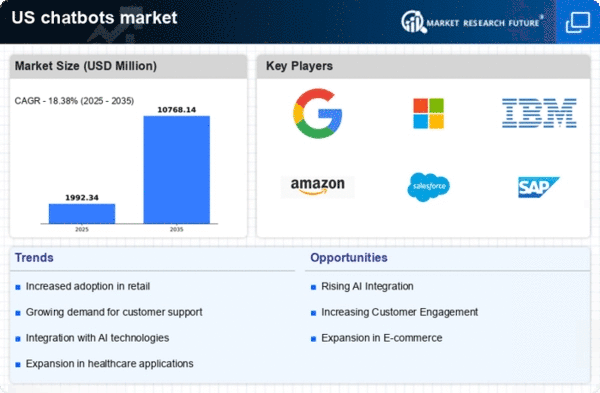Rising Demand for Automation
The chatbots market is experiencing a notable surge in demand for automation across various sectors. Businesses are increasingly recognizing the efficiency and cost-effectiveness that chatbots offer in automating customer interactions. According to recent data, the automation of customer service processes can reduce operational costs by up to 30%. This trend is particularly pronounced in industries such as retail and finance, where rapid response times are crucial. As companies strive to enhance customer satisfaction while minimizing expenses, the chatbots market is likely to see continued growth. The integration of chatbots into existing systems is becoming a strategic priority, further driving the expansion of the market. This rising demand for automation is expected to propel innovations in chatbot technology, making them more sophisticated and capable of handling complex queries.
Increased Focus on Customer Experience
In the chatbots market, there is a growing emphasis on enhancing customer experience. Companies are increasingly deploying chatbots to provide personalized interactions, which can lead to higher customer satisfaction rates. Research indicates that businesses utilizing chatbots for customer engagement have reported a 20% increase in customer retention. This focus on customer experience is not merely a trend but a strategic necessity in a competitive landscape. As consumers expect instant responses and tailored services, chatbots are becoming essential tools for businesses aiming to meet these expectations. The ability of chatbots to analyze customer data and preferences allows for more meaningful interactions, thereby fostering brand loyalty. Consequently, the chatbots market is likely to expand as organizations invest in technologies that enhance customer engagement and satisfaction.
Cost Efficiency and Resource Optimization
Cost efficiency remains a pivotal driver in the chatbots market, as businesses seek to optimize their resources. The implementation of chatbots can lead to substantial savings, with estimates suggesting that companies can save up to $1.3 trillion annually by automating customer service tasks. This financial incentive is particularly attractive for small and medium-sized enterprises (SMEs) that may have limited resources. By utilizing chatbots, these businesses can allocate human resources to more complex tasks while allowing chatbots to handle routine inquiries. This optimization of resources not only reduces operational costs but also enhances overall productivity. As organizations continue to prioritize cost management, the chatbots market is expected to grow, driven by the compelling need for efficient and effective customer service solutions.
Expansion of Digital Communication Channels
The proliferation of digital communication channels is a key driver of growth in the chatbots market. As consumers increasingly engage with brands through social media, messaging apps, and websites, the need for efficient communication solutions has become paramount. Data suggests that over 70% of consumers prefer to communicate with businesses via messaging platforms. This shift in consumer behavior is prompting companies to adopt chatbots as a means to facilitate seamless interactions across various channels. The ability of chatbots to operate on multiple platforms enhances their appeal, making them a versatile tool for businesses. As the digital landscape continues to evolve, the chatbots market is likely to expand, driven by the necessity for businesses to maintain a strong online presence and engage effectively with their customers.
Growth of AI and Machine Learning Technologies
The chatbots market is significantly influenced by the rapid advancements in artificial intelligence (AI) and machine learning technologies. These innovations are enabling chatbots to become more intelligent and capable of understanding complex queries. The market for AI in the US is projected to reach $190 billion by 2025, indicating a robust growth trajectory. As AI technologies evolve, chatbots are increasingly able to provide more accurate and context-aware responses, which enhances their utility in various applications. This growth in AI capabilities is likely to drive the adoption of chatbots across multiple sectors, including healthcare, finance, and retail. The integration of machine learning algorithms allows chatbots to learn from interactions, improving their performance over time. Thus, the chatbots market stands to benefit immensely from these technological advancements.

















